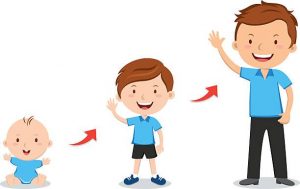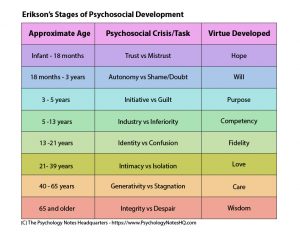Mental health is a difficult concept to apply to infants, but it is no less important. Infant mental health serves to shine a bright light on innate attributes, environmental and socio-cultural factors that influence a child’s ability to form healthy relationships, develop emotional intelligence, and continue to have positive development throughout life. It focuses on growth, learning, and positive relationships, as these form the bedrock of positive interaction with other humans and their environment.
 The goal of promoting mental health this early is to ensure that children grow with the right sense of security, self esteem, and can cope with life’s situations satisfactorily. Events that happen in the life of an individual mostly before the age of three are forgotten anyway so why bother, you say? Well, this concept is known as ‘normal infantile amnesia’ and although true, these early life events could still play a significant role in influencing and predicting cognitive, social, and emotional competence. I will explain in a minute.
The goal of promoting mental health this early is to ensure that children grow with the right sense of security, self esteem, and can cope with life’s situations satisfactorily. Events that happen in the life of an individual mostly before the age of three are forgotten anyway so why bother, you say? Well, this concept is known as ‘normal infantile amnesia’ and although true, these early life events could still play a significant role in influencing and predicting cognitive, social, and emotional competence. I will explain in a minute.
Trust vs Mistrust, the first stage in Erik Erikson’s theory of psychosocial development begins from birth to about 18 months of age. At this stage, the child is completely dependent on adults for stability and consistency of care. With consistency and predictability of care, they develop a sense of security and trust which they can develop as they grow. For example, a baby who cries because of a need; food, attention, wet diaper, etc and is not attended to, soon learns that there is a pattern of unmet needs and dissatisfaction. Or because the parent or caregiver could not figure out the child’s need, gave them a slap on the bum (and is upset when the child cries more). Inconsistent, unreliable care such as these may lead the infant to develop a sense of fear, anxiety, and mistrust. Success at this stage however helps the child to develop trust and hope, knowing that as situations come up there would always be an adult around to help or support.
 Autonomy vs Shame and Doubt is the second stage of Erik Erikson’s psychosocial development and it is seen between 18months and 3 years of age. It is at this stage that you want to button up your child’s shirt and they cry because they wanted to do it to do it themselves. The trick is even though you know they will not do it right, allow them. It helps them develop a sense of personal control and independence. As you permit them, they feel encouraged and develop more confidence in their own abilities and even when you are not there, they will still be confident enough to try.
Autonomy vs Shame and Doubt is the second stage of Erik Erikson’s psychosocial development and it is seen between 18months and 3 years of age. It is at this stage that you want to button up your child’s shirt and they cry because they wanted to do it to do it themselves. The trick is even though you know they will not do it right, allow them. It helps them develop a sense of personal control and independence. As you permit them, they feel encouraged and develop more confidence in their own abilities and even when you are not there, they will still be confident enough to try.
On the flip side, when you say something like ‘what can you do? I would rather not be delayed unnecessarily’ you might unwittingly be planting the seed of shame, doubt, and feeling of inadequacy in their own ability. If this continues, they may feel overly controlled and may grow to become overly dependent on others as they navigate the world. So, what can you do? Permit them. Allow them to pour some milk on their own cereal, guide them through it. You can have a smaller jug for them to reduce spillage if it would help. Encourage them to ask for assistance because you want to avoid constant failure as well. The goal is to encourage independence, but they do not have to pay for it with a dent to their self esteem.
 Other than consistency of care and encouraging independence, pattern of parenting also plays a role in influencing infant mental health. Early exposure to poor parenting can cause a blunted pattern of production of cortisol, a substance produced in the body, which can be associated with later development of callous- unemotional behavioural traits. Infants adopted from homes where caregiver-child relationships are discouraged also run a higher risk of having emotional behaviour problems even if they are adopted into healthy homes.
Other than consistency of care and encouraging independence, pattern of parenting also plays a role in influencing infant mental health. Early exposure to poor parenting can cause a blunted pattern of production of cortisol, a substance produced in the body, which can be associated with later development of callous- unemotional behavioural traits. Infants adopted from homes where caregiver-child relationships are discouraged also run a higher risk of having emotional behaviour problems even if they are adopted into healthy homes.
In conclusion to promote infant mental health, be the parent/caring adult that responds appropriately and consistently to your child’s needs. Ask questions. It is ok not to know and asking questions just might give you a head start in understanding what your child needs and how best to meet those needs or soothe them. Permit them as the explore the world through movement and sensations. As they begin to understand that their actions can cause things to happen around them be their guide. Above all, strive to build a healthy, loving family with caring and attentive adults.

Dr Omowunmi H. Thanni is a physician with a medical degree from Olabisi Onabanjo University Ago-Iwoye (Mb.ChB. Ogun). She is an Infant and Childhood Mental Health enthusiast who is passionate about supporting children with mental health concerns.
She is also an Early Childcare practitioner with experience observing children dealing with grief, the various psychosocial presentations, and the impact on their families. She is also a Child and Family Volunteer who serves as a healthy support system for children and families who have experienced the loss of one or both parents to terminal illnesses.
She is devoted to debunking cultural myths surrounding childhood mental health and enlightening the community on proper prevention and intervention strategies.

